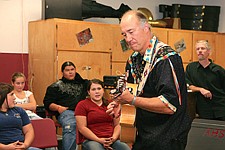Classroom jam session
d Native American story teller Jack Gladstone believes the ancient stories of his Blackfeet heritage should play an important role in today's world.
"Some people like to take mythology as fact, but I like to take it more as there is a lesson to learn," he said. "It's like cultural natural selection, passed on for centuries. There are powerful messages in this stuff."
Gladstone visited Arlee Schools on Monday for an action-packed day of Native American Awareness. He opened the morning with a general assembly and visited a number of classrooms before concluding with an evening performance open to the greater community.
"We have the capacity to transport our stories in other ways beside just the spoken word," Gladstone said. "What I have done with my career is I have taken those stories and converted them to song."
Through what he calls "the mythopoetic tradition," Gladstone's musical storytelling was inspired by a trip to Greece, he said. There, he learned about the legendary story of Odysseus, the hero of Homer's epic poems, the Odyssey and the Iliad.
"It was actually lyrical poetry suspended in the oral tradition for hundreds of years," he said. "For hundreds of years it guided Greece."
Gladstone saw a stout correlation between the ancient poem and the stories of his Native American heritage. He described the "cultural wreckage" of Native American cultures during the time of Lewis and Clark, but realized that through it all, their stories lived on.
One essential character in many Blackfeet tales, Napi, the trickster, often represents the negative side of humanity. For the tribes of the Flathead Reservation, he is comparable to the coyote, and responsible for shaping the morals and values of the people. In European tales, he can be characterized as the fox or named "Jack," coincidentally.
"He has a very functional component," Gladstone said. "He is both the shadow and the sunlight of the human spirit and the choices we make."
The hero, he said, recognizes that he is a part of something far more magnificent than just himself. The hero sees his own benefit tightly bound to the success of those around him, Gladstone told the students in the lyrics of one of his songs.
"We cherish what we've got and share if we got a lot," he sang. "Altruism is part of empathy. The whole idea is that we may appear separate, but in fact, we are as one."

